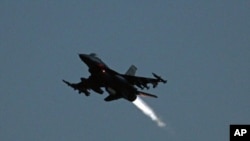Anti-Gadhafi forces now control most of Libya, thanks to help from the North Atlantic Treaty Organization. Some question, though, whether the Western alliance can sustain similar operations in the future.
For six months, NATO warplanes have been attacking forces loyal to Colonel Moammar Gadhafi. Analysts say the alliance in essence became the air force of the anti-Gadhafi fighters who, at the outset of the war, were on the verge of defeat but now control most of Libya.
Paul Rogers, professor of Peace Studies at Bradford University in Britain, said he is not surprised at the length of the war.
“If anything is a surprise, it is the speed with which it has suddenly come to an end. There have been pretty clear signals in the last four to six weeks that the regime has become more and more isolated and really coming toward the end," he said. "But I would have to say that by the end of the first two or three weeks of the war, I’d expected it to last right through the summer and maybe right through into Christmas. So in that respect, I, like some other analysts, were wrong.”
Many analysts are asking once this NATO mission is completed, can the Western alliance sustain similar operations in the future?
Charles Ries, a NATO expert and former U.S. ambassador to Greece, said it can.
“In an environment in which the United States is pulling its forces out of Iraq and moving towards reductions in Afghanistan, which will likely be matched by other NATO member countries, and the wind down of this [Libyan] enterprise in NATO - after a period of refit, maintenance and so forth, NATO should be ready to meet other challenges it might face,” said Ries.
But Sean Kay, a NATO expert at Ohio Wesleyan University, disagrees.
“Maybe too much has been expected from NATO and it may well be time to start to think about how to bring it back into a more sort of defensive posture, rather than taking on these out-of-area missions,” he said.
Kay said in the United States, there is a war weariness. He said for the first time in NATO’s history, the United States has relinquished the operational lead to the Europeans. And that, said Kay, could be the way of the future - if NATO decides to engage in other military ventures.
“After the Cold War, after World War II, Europe has to be able to take responsibility for at least its own backyard in terms of these kinds of operations," said Kay. "And I think there is going to be more and more pressure on them to figure out ways to better coalesce their defense cooperation, so the United States does not have to be leading it all in these kinds of things because the United States has global responsibilities and just can’t be there for every single crisis like this that happens.”
But Kay said European members of NATO face major economic problems that will affect defense budgets.
“America keeps saying Europe has to spend more and has to have more capabilities to do these things - but Europe is in a massive debt crisis, which is the real security threat to that entire region. The entire euro zone is potentially going to unravel. And so here we are, saying they should spend more on defense,” he said.
Analysts also point out, however, that the U.S. defense budget will be cut in the years ahead, which inevitably also will affect NATO’s capacity to engage in future military operations.



















